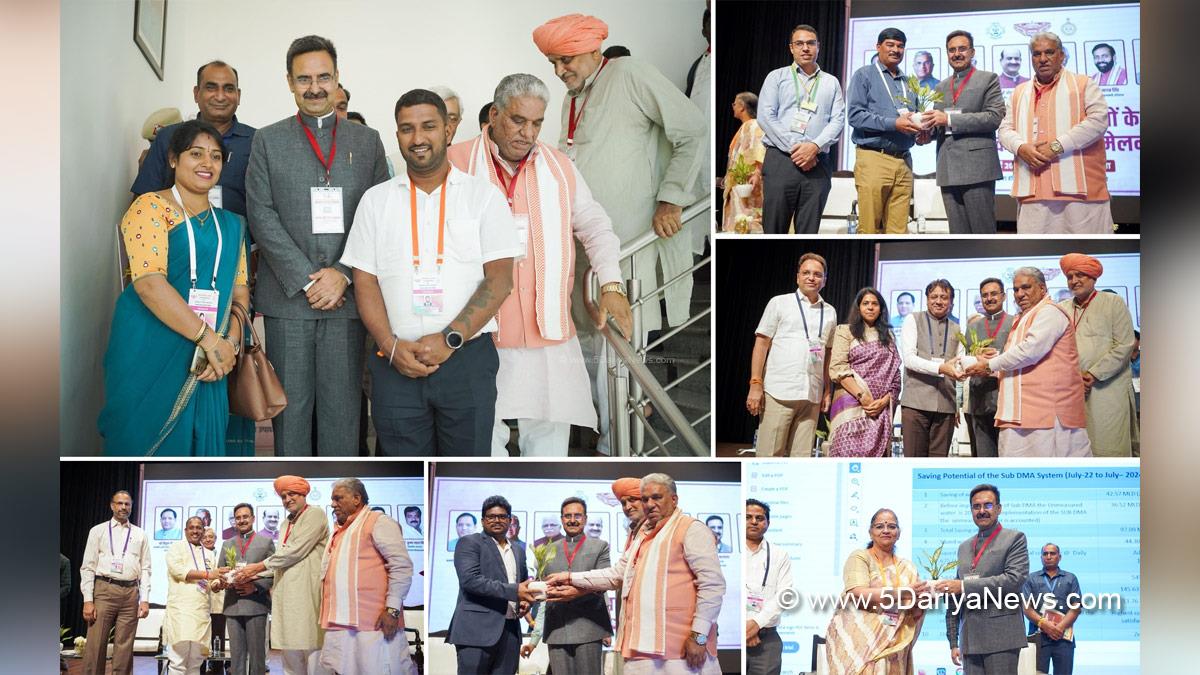Lucknow Municipal Corporation Rises to the Top in Just Two Years Through Public Awareness and Participation

Municipal Corporations of Lucknow, Pune, and Indore were recognized among the best-performing urban local bodies during the first national conference of urban local body Chairpersons held in Manesar. At the event, public representatives and administrative officers from these cities shared their best practices with counterparts from other states, fostering a collaborative exchange of innovative urban development strategies.
Lucknow highlighted initiatives such as the use of e-vehicles for waste collection in place of diesel or petrol-powered vehicles, the establishment of high-capacity waste processing plants, and the transformation of dumping sites into national inspiration points.
Pune showcased its ward-wise waste collection systems, electricity generation through biogas plants, and integrated waste management techniques. Indore presented successful models involving GPS-enabled garbage collection vehicles, the ‘Safai Mitra’ workforce, and active public participation in maintaining cleanliness.
Lucknow Mayor Sushma Kharkwal informed that the foundation of a developed India by 2047 rests on strong and efficient urban local bodies, where capable leadership and active citizen participation play a pivotal role. She said that, despite a population of nearly 50 lakh, Lucknow has emerged as a zero-waste city.
The city has also developed urban forests using the Miyawaki method and deployed mechanical sweepers to clean roads. To boost eco-tourism, attractions like the Mango Museum Park and nature trails are being created. Additionally, over 20,000 trees have been planted along the Kuret River as part of the national campaign Ek Ped Maa Ke Naam.
Pune’s Model of Waste Management Sets a Benchmark in Urban Sustainability
Pune’s waste management strategy, implemented since 2007, has significantly improved the quality of life for its residents. During the national conference, Pune Municipal Commissioner Puneet Raj and ward councilors presented impactful examples of waste collection and electricity generation from ward-level biogas plants.
They also highlighted successful initiatives such as slum redevelopment projects—transformed into permanent housing following necessary policy amendments—and the adoption of the Light House project under the Public-Private Partnership (PPP) model.
A standout example of sustainable development is Pune’s “tree ambulance” service and dedicated call center for urban greenery maintenance. Additionally, the city has introduced smart water meters and launched the Swachh Cooperative initiative for effective solid waste management.
Pune has also established 26 Triple R centers, where reusable items are made available to those in need. In another major achievement, a massive garbage dump that had accumulated over two decades at Sibri and Gehla was completely cleared within just two years. This was made possible through public participation, awareness campaigns, and effective operational strategies.
What was once a waste dumping site has now been transformed into a national inspiration site and potential tourism hub, with statues of national leaders installed to honor the transformation. This remarkable turnaround was achieved through seamless coordination between the municipal corporation and local administration.
Indore Shares Cleanliness Success Mantra at National Conference
During a key session of the two-day national conference, Indore Mayor Pushyamitra Bhargava and Commissioner Shivam Verma’s team shared the fundamental approach that has helped Indore retain its title as India’s cleanest city. Addressing municipal representatives from across the country, they emphasized that cleanliness in Indore is not just a civic duty—it’s a collective cultural mindset.
Indore, which comprises 85 municipal wards, has successfully instilled a strong sense of ownership among its citizens toward keeping their homes, neighborhoods, streets, and public spaces clean. This citizen-driven model is complemented by the dedication of Safai Mitras, who begin their duties every day at 6 a.m., playing a crucial role in implementing Prime Minister Narendra Modi’s Swachh Bharat Abhiyan on the ground.
The city’s sanitation operations are rigorously monitored by the local administration. Each waste collection vehicle is GPS-enabled, and delays as short as 10 minutes trigger immediate accountability measures for the driver concerned. This disciplined approach has resulted in the imposition of over Rs 1.5 crore in fines within a single year against those violating cleanliness norms.
He said that Indore is now evolving beyond just cleanliness, moving toward becoming a green and digital city. A remarkable milestone was achieved when 12.4 lakh saplings were planted in a single day—earning Indore a place in the Guinness Book of World Records.
Importantly, the vast majority of these saplings continue to thrive, contributing to environmental sustainability and spreading awareness about ecological responsibility.As part of the city’s digital transformation, unique ID numbers and QR codes are being affixed to homes. Residents can scan these codes to access municipal services and receive important civic information.
Additionally, to address traffic congestion, trained volunteers are engaging directly with citizens to promote traffic awareness and responsible road behavior. Indore’s model demonstrates that with strong leadership, community engagement, and technological integration, cities can achieve not only cleanliness but holistic urban excellence.

Comments are closed.